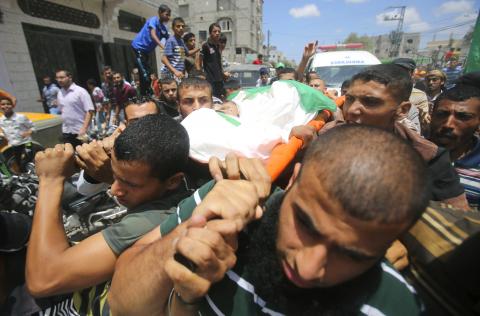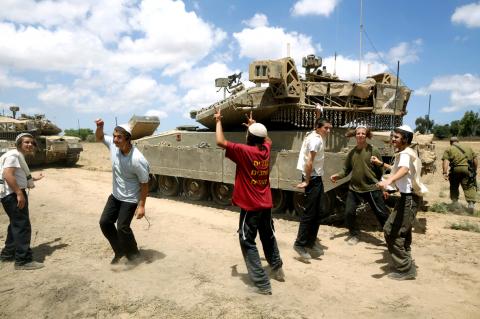Israel yesterday said it had agreed on a truce with Hamas to end 10 days of violence in Gaza, although the reported deal was denied by the Islamist movement.
News of a fresh attempt to end the worst bloodshed in the Gaza Strip in five years came during a five-hour humanitarian truce, under which both Israel and Hamas militants had agreed to hold their fire.
As relative calm returned to the skies over Gaza for the first time since Tuesday last week, Palestinian President Mahmoud Abbas was due to meet with his Egyptian counterpart, Abdel-Fattah al-Sisi, as Cairo pushed regional efforts to broker a new ceasefire deal. An earlier Egyptian attempt to end hostilities collapsed on Tuesday, with Hamas claiming it had not been included in the negotiations.

Photo: Reuters
Speaking on condition of anonymity, an Israeli official said the Jewish state and Hamas “have agreed on a ceasefire” that would begin at 3am GMT today.
However, Hamas shot down the report.
“The news about a ceasefire is incorrect. There are continuing efforts, but no agreement until now,” Hamas spokesman Sami Abu Zuhri said in Gaza.

Photo: AFP
Despite the diplomacy, there seemed little appetite from either side to end their confrontation, which has so far claimed the lives of 231 people in Gaza and one person in Israel.
During the five-hour humanitarian lull, which had been requested by the UN, militants in Gaza fired three mortar shells at southern Israel. And shortly after it ended at 12pm GMT, another Gaza rocket crashed near the southern port city of Ashkelon, the army said.
In a separate incident, an Israeli soldier was lightly injured by an explosion near the fence, with the army firing back across the border, the army said.
The two sides had agreed to temporarily suspend hostilities, with a senior UN official saying the Kerem Shalom crossing in southern Gaza would be opened to allow in medical aid. It also gave Gazans a chance to leave their homes and stock up on supplies, or pick up belongings from homes which they had evacuated.
In Gaza City, the streets immediately filled with honking cars and traffic jams, and outside banks, hundreds of people massed by ATMs to withdraw money to buy supplies.
“It’s not enough. People need to go out and get supplies and to get their belongings. It should have been from 7am until dusk,” Mohamed Nasr said.
“We’ve been stuck in our houses during this war, because of the violence. It’s like living under curfew,” he said.
Just moments before the humanitarian truce began at 7am GMT, Israeli tank fire killed three people in southern Gaza, Palestinian medics said.
The Israeli army also foiled a “major terror attack” by a group of 13 militants who managed to enter southern Israel by tunnel and were seen heading toward Sufa kibbutz near the fence, Israeli army spokesman Lieutenant Colonel Peter Lerner told reporters.
They were targeted in an air strike, which killed one and sent the others fleeing back into the tunnel, he said.
The raid was claimed by Hamas, which said its militants had carried out a successful “mission” into Israel.

MAKING WAVES: China’s maritime militia could become a nontraditional threat in war, clogging up shipping lanes to prevent US or Japanese intervention, a report said About 1,900 Chinese ships flying flags of convenience and fishing vessels that participated in China’s military exercises around Taiwan last month and in January last year have been listed for monitoring, Coast Guard Administration (CGA) Deputy Director-General Hsieh Ching-chin (謝慶欽) said yesterday. Following amendments to the Commercial Port Act (商港法) and the Law of Ships (船舶法) last month, the CGA can designate possible berthing areas or deny ports of call for vessels suspected of loitering around areas where undersea cables can be accessed, Oceans Affairs Council Minister Kuan Bi-ling (管碧玲) said. The list of suspected ships, originally 300, had risen to about

DAREDEVIL: Honnold said it had always been a dream of his to climb Taipei 101, while a Netflix producer said the skyscraper was ‘a real icon of this country’ US climber Alex Honnold yesterday took on Taiwan’s tallest building, becoming the first person to scale Taipei 101 without a rope, harness or safety net. Hundreds of spectators gathered at the base of the 101-story skyscraper to watch Honnold, 40, embark on his daredevil feat, which was also broadcast live on Netflix. Dressed in a red T-shirt and yellow custom-made climbing shoes, Honnold swiftly moved up the southeast face of the glass and steel building. At one point, he stepped onto a platform midway up to wave down at fans and onlookers who were taking photos. People watching from inside

Japan’s strategic alliance with the US would collapse if Tokyo were to turn away from a conflict in Taiwan, Japanese Prime Minister Sanae Takaichi said yesterday, but distanced herself from previous comments that suggested a possible military response in such an event. Takaichi expressed her latest views on a nationally broadcast TV program late on Monday, where an opposition party leader criticized her for igniting tensions with China with the earlier remarks. Ties between Japan and China have sunk to the worst level in years after Takaichi said in November that a hypothetical Chinese attack on Taiwan could bring about a Japanese

The WHO ignored early COVID-19 warnings from Taiwan, US Deputy Secretary of Health and Human Services Jim O’Neill said on Friday, as part of justification for Washington withdrawing from the global health body. US Secretary of State Marco Rubio on Thursday said that the US was pulling out of the UN agency, as it failed to fulfill its responsibilities during the COVID-19 pandemic. The WHO “ignored early COVID warnings from Taiwan in 2019 by pretending Taiwan did not exist, O’Neill wrote on X on Friday, Taiwan time. “It ignored rigorous science and promoted lockdowns.” The US will “continue international coordination on infectious